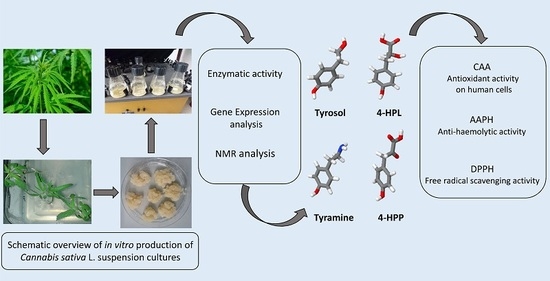 “Cannabis sativa L. is one of the most-studied species for its phytochemistry due to the abundance of secondary metabolites, including cannabinoids, terpenes and phenolic compounds. In the last decade, fiber-type hemp varieties have received interest for the production of many specialized secondary metabolites derived from the phenylpropanoid pathway. The interest in these molecules is due to their antioxidant activity.
“Cannabis sativa L. is one of the most-studied species for its phytochemistry due to the abundance of secondary metabolites, including cannabinoids, terpenes and phenolic compounds. In the last decade, fiber-type hemp varieties have received interest for the production of many specialized secondary metabolites derived from the phenylpropanoid pathway. The interest in these molecules is due to their antioxidant activity.
Since secondary metabolite synthesis occurs at a very low level in plants, the aim of this study was to develop a strategy to increase the production of such compounds and to elucidate the biochemical pathways involved. Therefore, cell suspensions of industrial hemp (C. sativa L. var. Futura) were produced, and an advantageous elicitation strategy (methyl jasmonate, MeJA) in combination with precursor feeding (tyrosine, Tyr) was developed.
The activity and expression of phenylalanine ammonia-lyase (PAL) and tyrosine aminotransferase (TAT) increased upon treatment. Through 1H-NMR analyses, some aromatic compounds were identified, including, for the first time, 4-hydroxyphenylpyruvate (4-HPP) in addition to tyrosol. The 4-day MeJA+Tyr elicited samples showed a 51% increase in the in vitro assay (2,2-diphenyl-1-picrylhydrazyl, DPPH) radical scavenging activity relative to the control and a 80% increase in the cellular antioxidant activity estimated on an ex vivo model of human erythrocytes.
Our results outline the active metabolic pathways and the antioxidant properties of hemp cell extracts under the effect of specific elicitors.”

